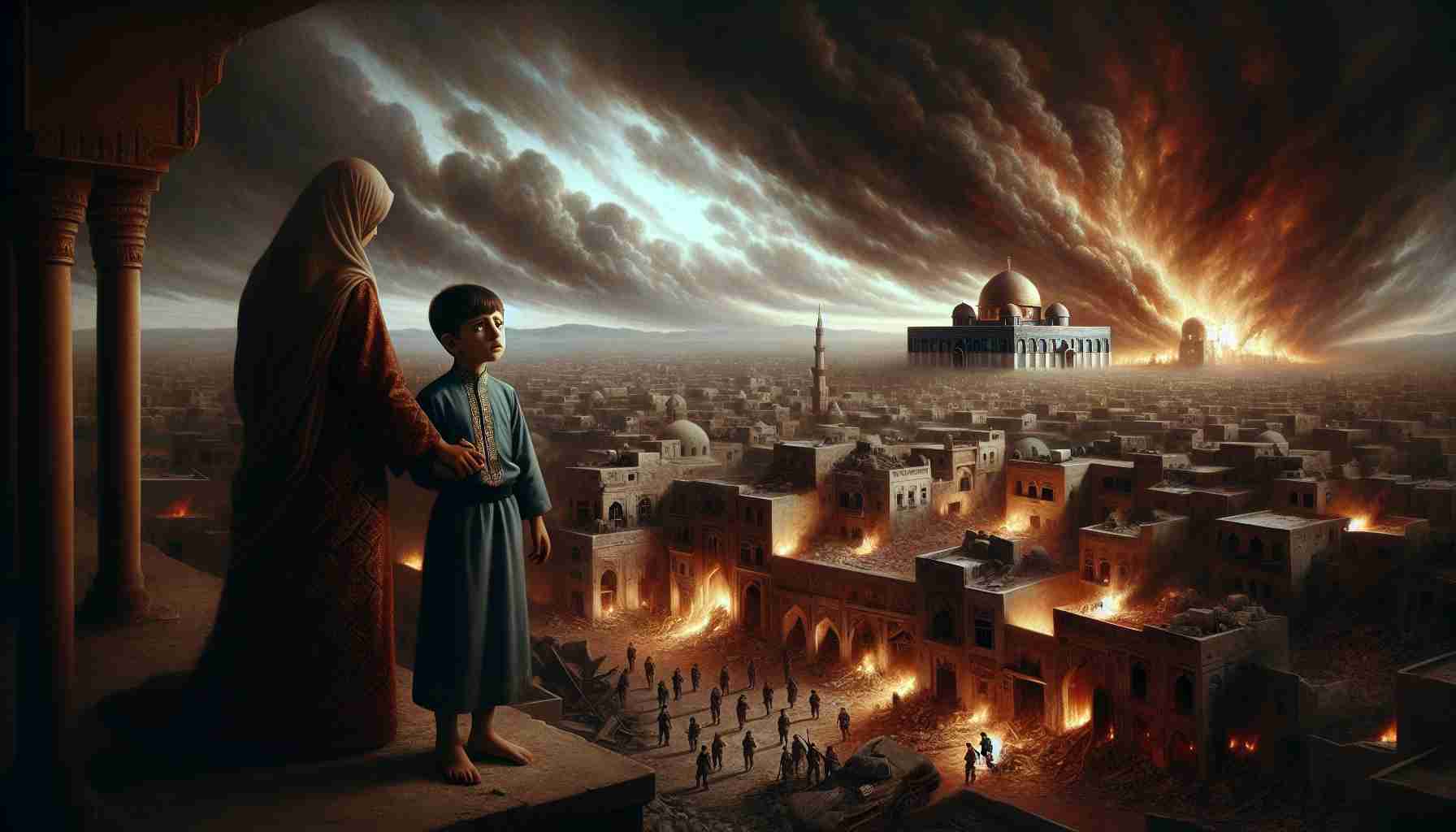

The smoke stung my eyes, but I couldn't look away.
I was only twelve, hiding behind the broken stones of what used to be my father’s shop—just a few streets from the gates of Yerushalayim, the holy city you may know as Jerusalem. You won’t find my name in any scroll. I wasn’t anyone important—just a boy who loved to chase pigeons through the courtyard of the Beit HaMikdash, the Holy Temple.
Now it burned before me.
The fire had started in the palace. The soldiers of Bavel—Babylon—came like a storm, breaking through our walls. King Tzidkiyahu—Zedekiah, the last king of Yehudah—had fled, but they caught him near Yericho and brought him back in chains. Those who survived the sword were taken away, prisoners marching east toward rivers I had never seen.
I had hidden. I don’t know why the guards didn’t see me. Maybe they did, but they didn’t think a boy alone was worth the trouble.
I sat for hours, too afraid to breathe. Something cracked behind me—a brick shifting, or maybe a cat—and I gasped. A hand clamped over my mouth.
“Quiet!” someone hissed in my ear. “You’ll get us both killed.”
It was a woman, older than my mother. Her skin was ash-covered, and her eyes were fierce. She dragged me deeper into the rubble and didn’t let go of my arm until night came.
Her name was Rivkah. “I was a baker’s wife,” she said later, as we sat beside a pile of cold coals. “Now I am just someone who remembers how the bread used to smell.”
We stayed hidden together for three days. I don’t remember eating, but I remember her prayer. Every morning—even with the Temple gone and the Babylonian soldiers marching—she whispered the Shema, the ancient words we say to remind ourselves that even in exile, even in sorrow, God is still One.
One night, I asked her, “Why didn’t God stop them? Why let Yerushalayim fall?”
Her eyes filled with tears, but her voice was steady. “Because we stopped listening. The prophets warned us—Yirmiyahu, you know him as Jeremiah. He cried through the streets, but we laughed at him. We left the mitzvot—the commandments—and forgot the poor and the stranger. And when we turned from God, He let us see what life without Him becomes.”
“But if we failed,” I whispered, “what’s left?”
She put her hand over mine. “Teshuvah,” she said softly—the return to God after doing wrong. “Exile doesn’t mean the end. It means we have a chance to come back.”
When the soldiers left, we slipped away together. Years passed before I saw another wall of Yerushalayim. But I carried Rivkah’s words with me, like the tiny scrap of Torah she had folded in her pocket.
Even when a city burns, hope can survive.
Even when all seems lost, we can return.
The smoke stung my eyes, but I couldn't look away.
I was only twelve, hiding behind the broken stones of what used to be my father’s shop—just a few streets from the gates of Yerushalayim, the holy city you may know as Jerusalem. You won’t find my name in any scroll. I wasn’t anyone important—just a boy who loved to chase pigeons through the courtyard of the Beit HaMikdash, the Holy Temple.
Now it burned before me.
The fire had started in the palace. The soldiers of Bavel—Babylon—came like a storm, breaking through our walls. King Tzidkiyahu—Zedekiah, the last king of Yehudah—had fled, but they caught him near Yericho and brought him back in chains. Those who survived the sword were taken away, prisoners marching east toward rivers I had never seen.
I had hidden. I don’t know why the guards didn’t see me. Maybe they did, but they didn’t think a boy alone was worth the trouble.
I sat for hours, too afraid to breathe. Something cracked behind me—a brick shifting, or maybe a cat—and I gasped. A hand clamped over my mouth.
“Quiet!” someone hissed in my ear. “You’ll get us both killed.”
It was a woman, older than my mother. Her skin was ash-covered, and her eyes were fierce. She dragged me deeper into the rubble and didn’t let go of my arm until night came.
Her name was Rivkah. “I was a baker’s wife,” she said later, as we sat beside a pile of cold coals. “Now I am just someone who remembers how the bread used to smell.”
We stayed hidden together for three days. I don’t remember eating, but I remember her prayer. Every morning—even with the Temple gone and the Babylonian soldiers marching—she whispered the Shema, the ancient words we say to remind ourselves that even in exile, even in sorrow, God is still One.
One night, I asked her, “Why didn’t God stop them? Why let Yerushalayim fall?”
Her eyes filled with tears, but her voice was steady. “Because we stopped listening. The prophets warned us—Yirmiyahu, you know him as Jeremiah. He cried through the streets, but we laughed at him. We left the mitzvot—the commandments—and forgot the poor and the stranger. And when we turned from God, He let us see what life without Him becomes.”
“But if we failed,” I whispered, “what’s left?”
She put her hand over mine. “Teshuvah,” she said softly—the return to God after doing wrong. “Exile doesn’t mean the end. It means we have a chance to come back.”
When the soldiers left, we slipped away together. Years passed before I saw another wall of Yerushalayim. But I carried Rivkah’s words with me, like the tiny scrap of Torah she had folded in her pocket.
Even when a city burns, hope can survive.
Even when all seems lost, we can return.